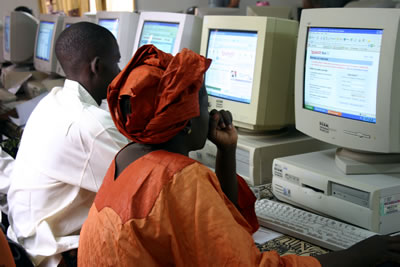Bamako 2000: Futuristic name, timeless dialogue
ICT conferences come and go, but their discussions live on. Take, for example, Bamako 2000, a futuristic-sounding global conference on ICT. Eleven years later the themes of privatization, regional cohesiveness, and the role of government still ring true as information communications technologies evolve.
I am happy to say that we have at our disposal a technology of which our forefathers could only dream; a technology which can transform local happenings into global events. That is the technology of telecommunications.” – Yoshio Utsumi, former Secretary-General, ITU
In February 2000, delegates from across the globe (and Africa) met in Bamako, Mali for intensive dialogue on the promotion, use, and appropriation of information and communication technology. Present were public officials, businessmen, academics, women, youth, and everyone else in-between. Based on an analysis of high-level global ICT trends from 1996-2000, the conference recommended having civil society, public authorities, enterprises, and organizations throughout the world to join in the endeavor to implement the rather involved Plan of Action. Although the primary goal of the gathering was to continue building bridges to development established four years prior, the African setting was used to stress the importance of regional advancement. After all, alliances, be they global, regional, national, private, or public, are necessary for individual nations to experience optimal telecoms growth and functionality.
Speeches:
Few first-hand accounts or transcriptions of the events’ sessions are found, but notes on speech by Aminata Traoré, former Malian Minister of Culture and Tourism shed light on the seriousness of event. Madame Traoré reminds us that ICTs are not mere supports for politics or social progress. In short, she suggests that technology and socio-political change are two separate revolutions. With great concern, Mme. Traoré goes on to question the educational significance of the Internet. That is, will the Internet lead to a boost in capacity-building and decision-making or will it contribute to cultural alienation? Finally, she warns not to blame developmental failures on politicians. Instead, failures are tied to global interactions that Africa must challenge.
The speech seems to have raised more questions that it answered, notably:
- Will Africa harness the power of the Internet to become more independent?
- How will ICTs be used?
- Will the Internet clarify benchmarks in schooling or only make them worse?
- Will Africans grow to see the Internet like they have the television?
Yoshio Utsumi, Secretary-General of the International Telecommunication Union touches upon the characteristics of the telecommunications revolution. He specifically notes the growing support for the abolishment of monopolies, the growth of mobile phones, and the construction of voice, data, and video networks. Mr. Utsumi’s explanation of how telecoms privatization increases competition and decreases end-user costs is especially succinct: “The recipe involves four main ingredients: competition, private sector participation, independent regulation and the use of the newest technologies.” Mr. Utsumi, unlike Mme. Traoré, stresses the need for government to encourage the development process through new regulatory framework and changes to the business environment.
Results:
Immediate results of the conference are easier to quantify than long-term benefits. Cameroon, for example, used the event as an impetus to re-visit a national ICT plan. Host nation Mali also had an ICT plan enacted shortly after the conference. Senegal, in turn, used the conference to partially shape its national plan. Long-term goals, all still very meaningful for 2011, are summarized below.
ICTs should:
- require international cooperation
- depend on domestic resources
- be accessible to all nations
- enhance relations among people
- provide identity to isolated areas
- contribute to societal change
- universal access to information
- right to freedom of expression
- reduction of ICT regulatory obstacles
- improvement of monetary policy to increase access
- local content development
- defined roles for state and private sector (state creates positive environment, private acts as driving force)
- simplify forms of partnership
- better human networking to increase knowledge
- human capacity building
- democratic debate













 Twitter
Twitter Facebook
Facebook Pinterest
Pinterest